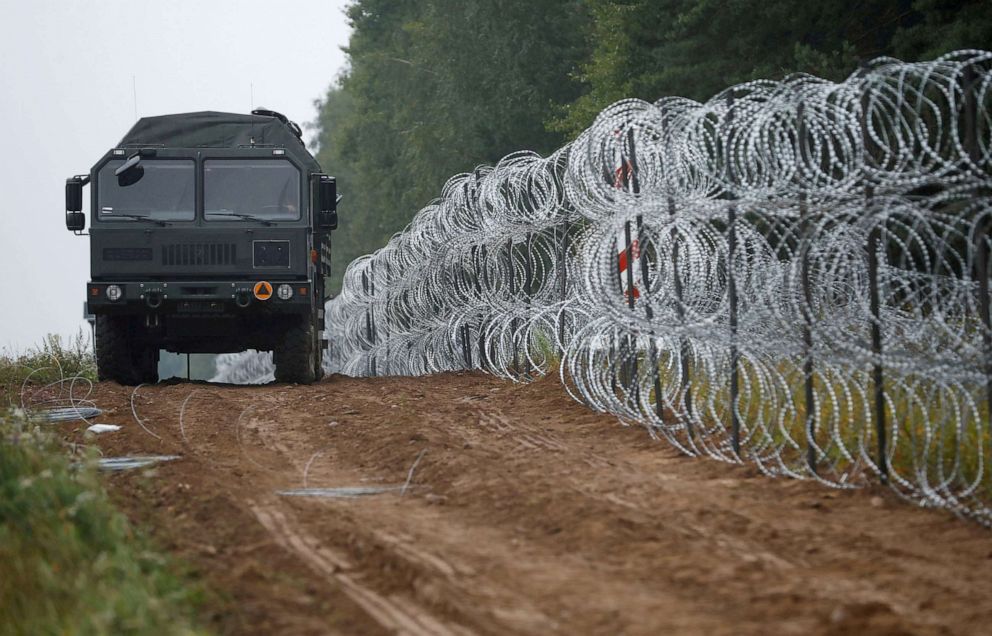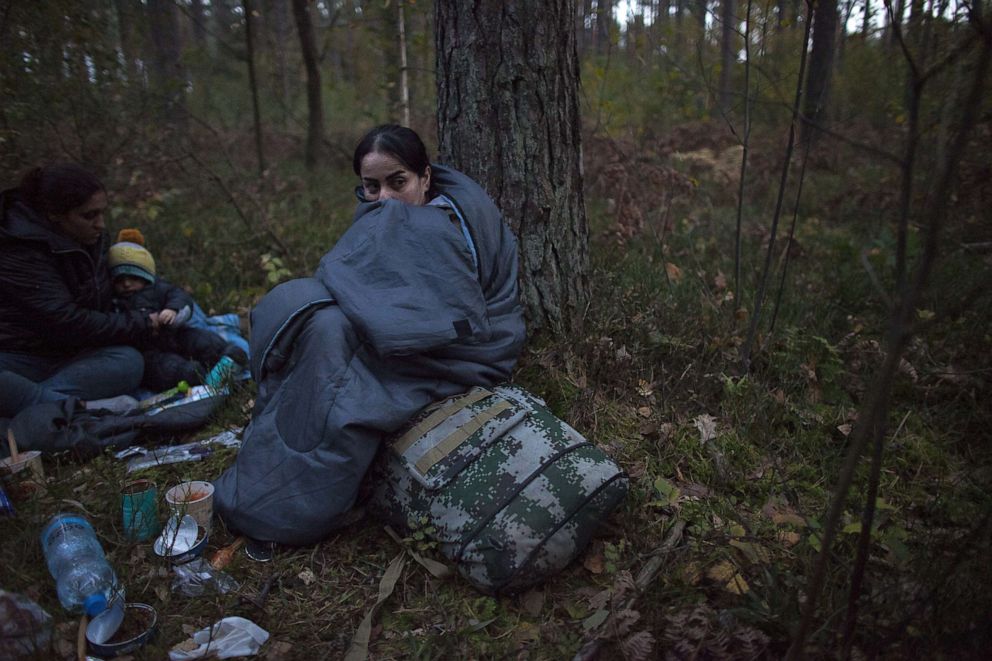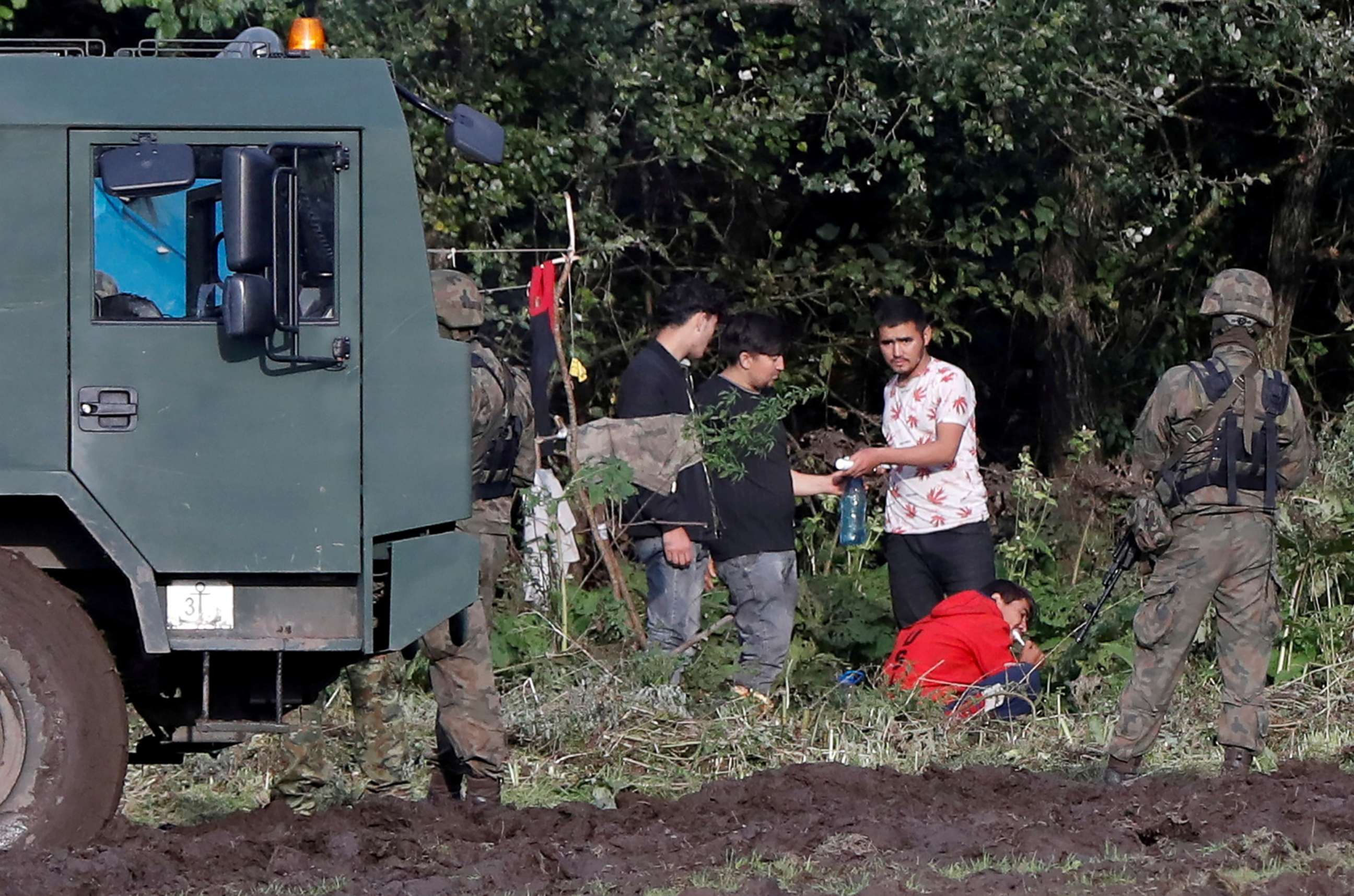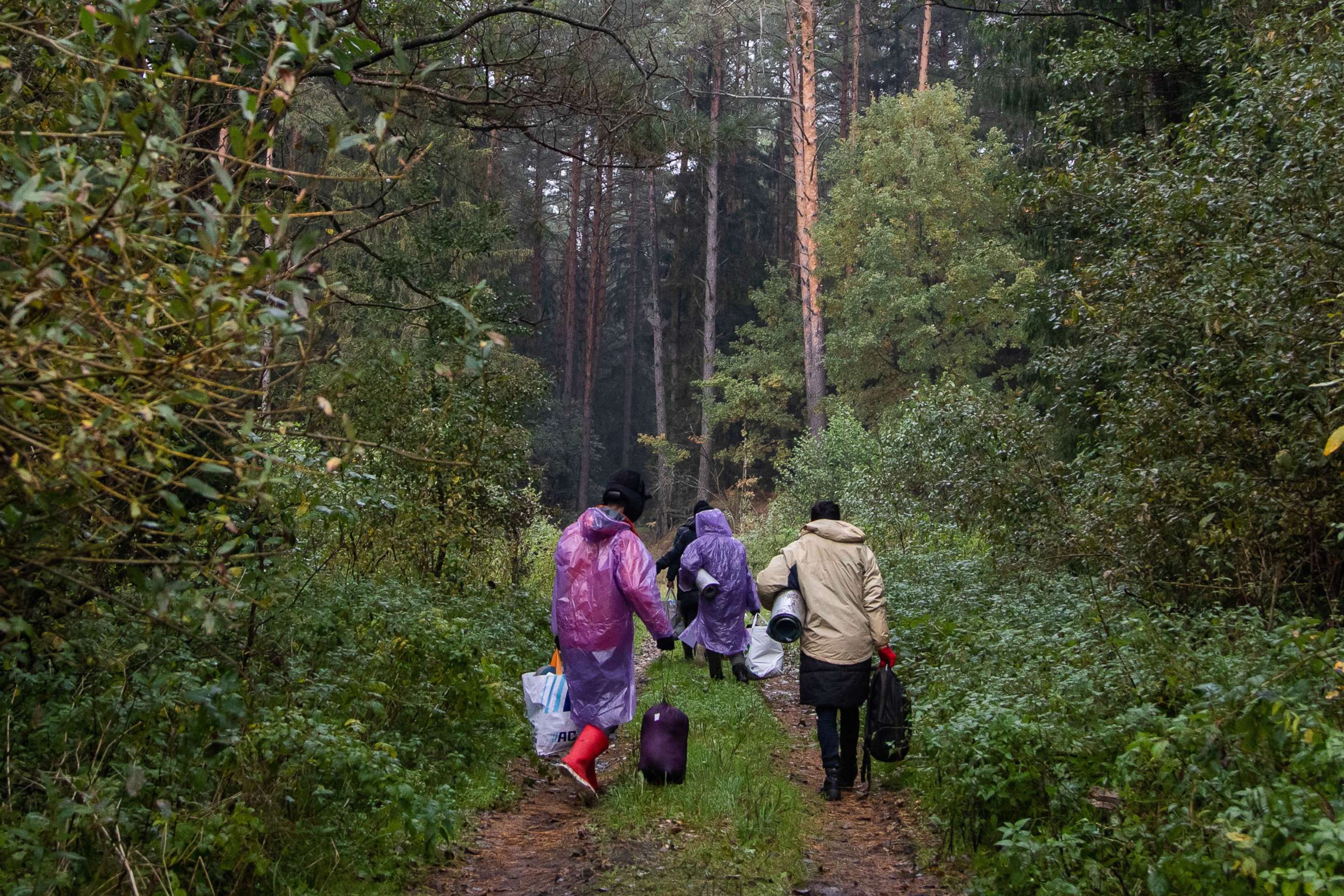Trapped in the woods: Belarus accused of using migrants as weapons
Dozens of people are trapped in forests between Poland and Belarus.
LIPSK, Poland -- It was pitch black as the activists entered the forest. Even with headlamps and torches, their beams shone only small windows into the darkness, illuminating the trunks of birch trees.
The activists, from the migrants rights group, Grupa Granica, were looking for a small group of men who a short while ago had crossed the border from Belarus into a corner of northeastern Poland.
The men being sought were among hundreds of people trapped in forests where the European Union shares borders with Belarus; men caught in a worsening -- and highly unusual-- migration crisis on the bloc's eastern frontier.

For months, the border between Belarus, Poland and Lithuania has seen a surge of migrants, that European countries allege is orchestrated by Belarus' authoritarian leader Alexander Lukashenko in retaliation for their support of the pro-democracy protest movement that came close to toppling him last year.
Lukashenko -- often dubbed 'Europe's last dictator'-- is accused of luring migrants, mostly from the Middle East, to Belarus by offering easy access to Europe and then pushing them over the border into Poland and Lithuania. The number of migrants crossing has soared in recent months from what is normally a few dozen to thousands, with many headed to Germany and other Western European countries, according to Polish and Lithuanian authorities.
But in response, Poland and Lithuania have begun blocking the arrivals, deploying extra border guards, erecting fences and also allegedly pushing back many without allowing them to file for asylum, a violation of international law.
The result is that dozens -- likely hundreds -- of people are now reportedly trapped in a no-man's land throughout the dense forests between Belarus and Poland, bouncing between the countries' security forces and without food or shelter, often for weeks, according to testimonies from those trapped.
At least five migrants have died already, according to Polish and Belarusian officials, as temperatures fell close to freezing.
In Poland, activists from human rights groups and charities say they are trying to help the migrants, bringing food, clothes and assistance with asylum claims to prevent border guards from forcing people back across the border
The activists ABC News accompanied last week said they had received a call for help from three men around midnight one day last week. As the activists searched the woods, they shouted, "Don't be afraid. We are not the police," and made low whistles, a previously agreed upon signal with the men.
Eventually they found three terrified, shivering men from Yemen. One was without shoes.
"We were there fifteen days, without food, without anything," one man, Rami Olaqi told the activists as they quickly gave Olaqi and the other men snack bars and tea. "We are drinking from streams and we're eating from trees. The Belarusian army said, 'If we see you again, we will kill you,'" he said.
Olaqi, an IT engineer, said he was fleeing Yemen's civil war. They had been in the woods almost since landing in Belarus' capital, Minsk, and were from a group of 16 Yemenis, the remainder still stuck on the border's Belarusian side. They said they had tried to cross the border four times, but each time had been pushed back by Polish guards.
Belarus accused of funneling thousands of migrants to border due to Western sanctions
Back on the other side, Olaqi said Belarusian border guards had grabbed them and forced them back toward Poland. Olaqi says the guards shoved them back, and that Belarusian guards had beaten and robbed them, taking anything they wanted from the men's bags.

He said after catching them again, the Belarusian guards had thrown the men into a river.
"They don't care," he said. "It will be better for them if we die, you know. Because 'Look, Poland is killing refugees.' That's what we understand now."
It's just a way "for the Belarusian state to intimidate Europe. And using the refugees as a bullet in their war," Olaqi said.
Lukashenko has publicly threatened to flood Europe with migrants, presumably in retaliation for EU sanctions on his regime for its crackdown on the protests and for hijacking a Ryanair passenger flight in May.
"We were stopping drugs and migrants -- now you will catch them and eat them yourselves," Lukashenko said in a speech in May.
Belarus has eased visa restrictions for many countries. In July, Lukashenko issued a decree allowing citizens of 73 countries to travel to Belarus without a visa for five days. WhatsApp and Facebook groups have sprung up where smugglers offer passage to Germany and other western European countries via Belarus and many migrants said they had used travel agencies to acquire invitations to come.
At the border, several migrants told ABC News that Belarusian security forces were coordinating migrant crossings.
Boushra Al-Moallem, a teacher from Syria who said she had spent 20 days in the forest, said Belarusian guards had separated people into groups and then led them to crossing points at the border, picking the time they would cross.
"They were choosing the people who should go in each group," she said. Al-Moallem said people like her had been caught up in the conflict between Belarus and Poland. "It's a bad war -- and we are the weapons," she said.
Several migrants alleged they were robbed of their money, phones and documents by Belarusian guards before being pushed over the border into the forest. When they try to return, Belarusian police shove them back again and threaten them, they said.
Under international and European law, Poland is obligated to consider any asylum applications made on its territory. But some of the migrants and activists say Polish border guards are refusing to accept the applications and instead push people back across the border.
That meant a harrowing choice for Olaqi and other men fleeing from Yemen. The activists helped them fill out asylum papers on the forest floor. But in order to apply they would need to summon the Polish border guards -- the same guards that had repeatedly driven them back into the woods.
The activists explained said that they hoped the presence of foreign media would prevent the guards from doing so again but there was no guarantee. With no other plan, Olaqi and another man decided to risk crossing the border.
When the guards arrived they were polite and said they would take the men to a nearby border station, something the activists credited to the media cameras on-site. Poland's border service later confirmed the two men had been permitted to apply for asylum and would now be sent to a migrant center while they awaited the decision.

Such cases, though, are still the exception. Activists are responding to almost daily calls of people being pushed back from Poland, regardless of whether they claim asylum, said Kalina Czwarnog, from the immigrant rights group Fondacja Ocalenie. Czwarnog said she had witnessed young children being pushed back and that injured migrants were sometimes transported from hospitals back into the woods.
Poland's government has defended its border service's actions, arguing it is permitted to push people back to Belarus since they are not in danger there, an argument disputed by most experts in asylum law.
"We are not pushing back those people to Syria or, I don't know, Afghanistan," Poland's deputy foreign minister Marcin Przydacz told the German broadcaster Deutsche Welle this week. He did not deny that Polish border guards were pushing people back across the border, saying most wanted to apply for asylum in Germany, not Poland. He said the focus should be on the fact that this was an "artificial crisis, orchestrated by the Belarusian regime."
By declaring a state of emergency Poland has created a closed zone along the border, which critics say is mostly intended to prevent activists and media from documenting the treatment of migrants. Police checkpoints block access to many villages in the zone and journalists entering risk arrest. The activists are only able to help those that make it outside the zone.
Lithuania initially allowed more asylum seekers to enter the country, taking in over 4,000 and housing them at first, mainly in tent camps. As the weather grows colder, the country has moved many migrants to more permanent facilities, including a prison at Kybartai.
When ABC News visited last week nearly 700 men were housed at Kybartai, living in a former cell block. Families and more vulnerable people are kept in different centers.
But Lithuania so far has granted just one asylum request of 900 already processed, according to its interior ministry. Over 2,500 more are pending.

On Wednesday there was a possible sign that Lukashenko might be backing down. A travel agency,Anex Tour, published a notice that Belarus was no longer issuing visas on arrival at Minsk airport for citizens Syria, Afghanistan, Yemen, Pakistan and Nigeria. Belarus' foreign ministry however has not confirmed that to ABC News.
Sviatlana Tsikhanouskaya, Lukashenko's main opponent, who was forced into exile last year during the mass protests, said she was urging European countries not to lose sight that Lukashenko is the root cause of the crisis.
"I always remind them, don't forget who's guilty in this," she told ABC News in an interview last week. "Migrants are also a hostage of this regime."
She said EU countries needed to show a unified front against Lukashenko and warned that calls for Poland and Lithuania to accept all migrants arriving would play into his hands. She said Lukashenko was counting on criticism over human rights in European countries forcing them to give in before he did.
"Lukashenko knows that organizations in Europe are worrying about the situation and they can put pressure on the Polish government, Lithuanian government, but they can't put any kind of pressure to the dictator because he doesn't care," she said. "He knows the rules and misuses them. Poland, Lithuania, Latvia are being blackmailed by Lukashenko. That's why unity is crucial here."




